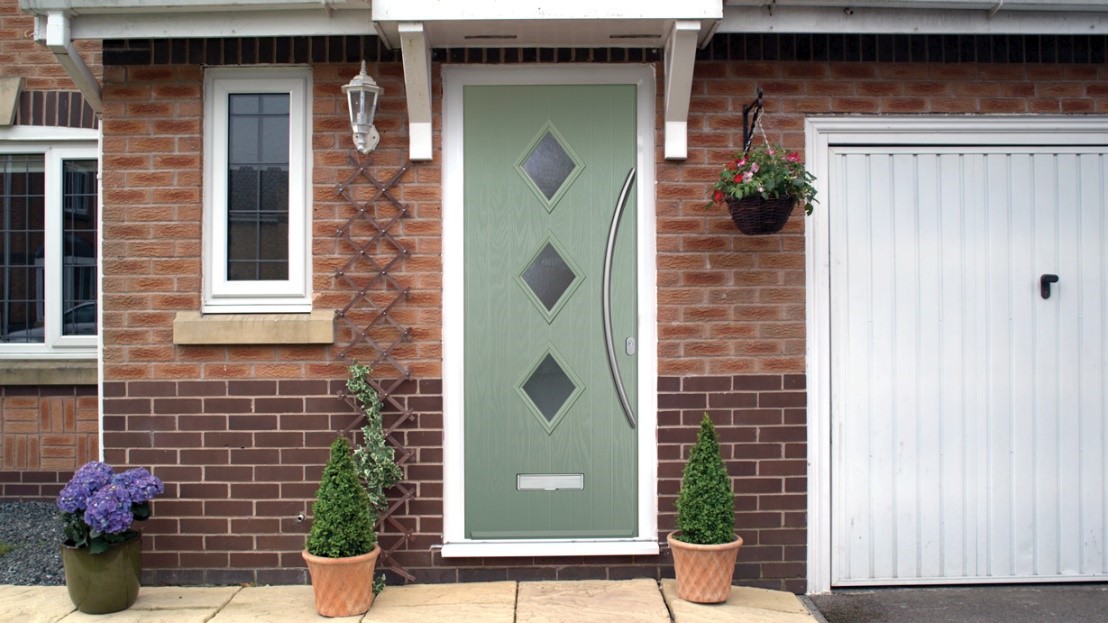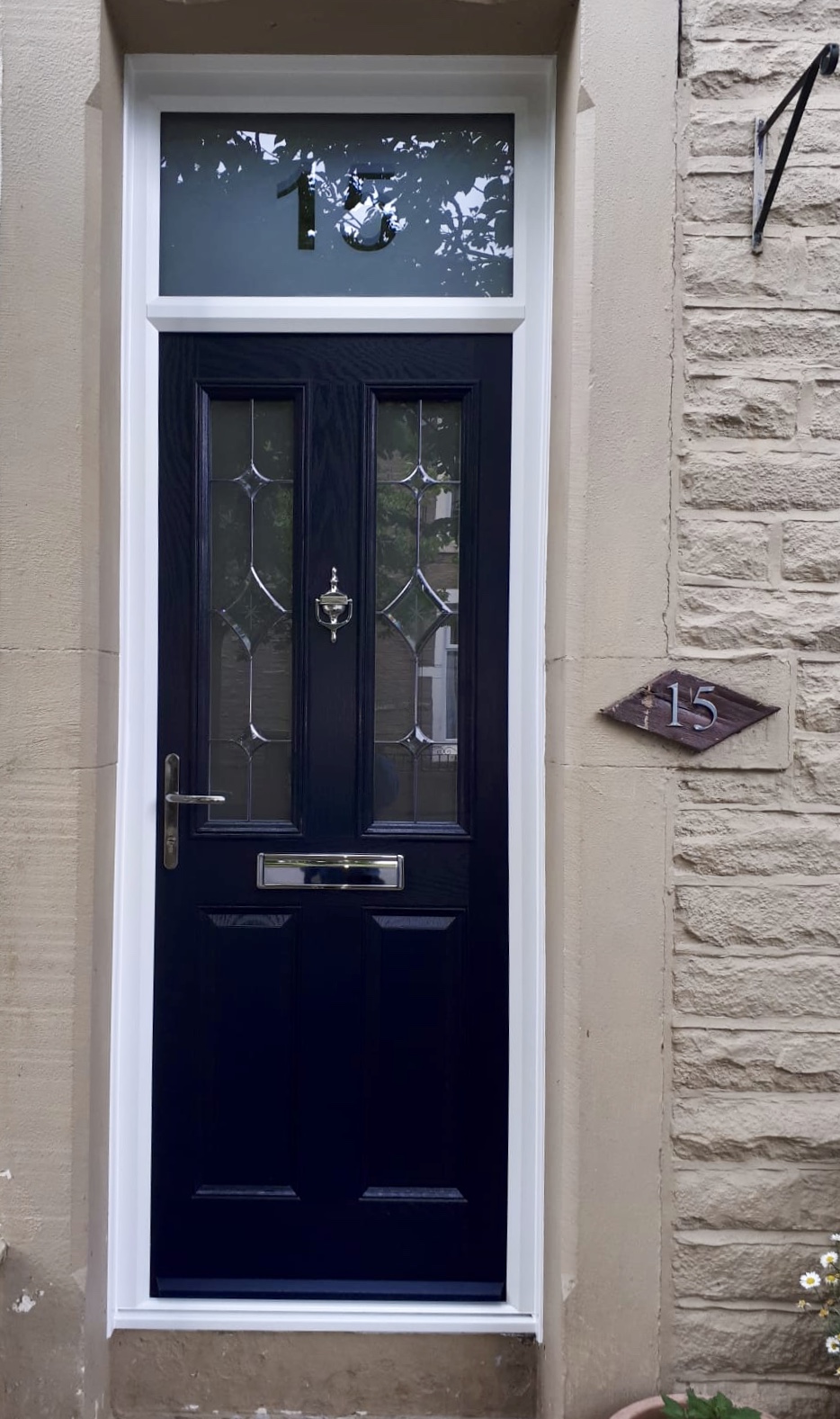UPVC and composite doors have some similarities; they’re both low maintenance, secure and they insulate properties very well. However, even though they are equal in these respects, they have plenty of differences. Let us explain in more detail.
What is a composite door?
A composite door is a type of front or back door that is constructed using a combination of materials. They feature solid cores that are built from insulating materials, such as solid timber and ultra-dense polyurethane foam. These cores are surrounded by Glass Reinforced Plastic (GRP) skins. They also incorporate multipoint locking mechanisms, glass panels and more, depending on their configuration and style.
Here at Great Harwood Windows, we offer a range of types of composite doors: including Solidor, Rockdoor, Doorstop and Endurance composite doors. Although their features and styles differ somewhat, each is renowned for its outstanding performance, security style.
Learn More

What is a UPVC door?
Unplasticised polyvinyl chloride, or UPVC, is a rigid, durable plastic used in the construction of various products. This includes fascias and cladding in addition to doors. However, UPVC doors are also fitted with multipoint locks, glazing and many, including our own, feature reinforced frames.
Are composite and UPVC French doors available?
Although composite doors are primarily used as an entrance door for the front or back of the property, double composite doors, which feature the classic two-door design of French doors, are also available.
UPVC French and sliding patio doors are also available from us here at Great Harwood Windows.
Learn More
Do composite doors cost more than UPVC?
When it comes to UPVC and composite entrance doors, composite doors are the more expensive option. However, they have an expected lifespan of around 35 years, compared to 25 years for UPVC doors. So, because of their longer lifespan, they may offer better long-term value.
Our blog on whether composite doors offer better value for money can provide deeper insight into this subject.
Are UPVC doors the most secure?
Thanks to reinforced frames and multipoint locking systems, UPVC doors offer excellent security for the home. However, composite doors also have an edge in this regard. In addition to complex locking mechanisms, they are reinforced by dense cores, toughened frames and damage-resistant GRP skins.
Rockdoor doors, for example, feature 3-star diamond locking cylinders and multipoint locks, which are supported by toughened glass and high-impact UPVC skins. Rockdoor’s S-Glaze technology also ensures the glass is part of the door, meaning it cannot be removed and would-be intruders are unable to force their way inside.
Learn More

How much maintenance do they require?
When it comes to maintenance, both UPVC and composite doors are designed to be as easy to keep maintain as possible; simply giving them the occasional clean, checking and oiling their hardware periodically will keep both types of doors looking great and performing their best. Our guide to care and maintenance is really useful and can be found here.
What colours and finishes are there for UPVC and composite doors?
Composite doors are available with smooth finishes that resemble aluminium, and these are ideal for contemporary homes. However, embossed woodgrain finishes, which resemble the texture of real wood, are also available. This option is especially well suited to country cottages, period homes and other traditional properties. As we offer 3 different types of composite doors, there is a wealth of different colours to choose from too.
UPVC doors can also be made to look like a timber doors because a wide range of woodgrain foils can be applied to the surface of UPVC. However, there are also smooth finishes and various colour options to select from.
Our top 10 coloured front doors blog can provide some inspiration for the door’s finish.
Learn More
Are UPVC or composite doors more energy-efficient?
As a natural insulator, UPVC does an excellent job at keeping warm air inside the home and preventing cold air from getting in. Plus, they have multiple heat-trapping chambers integrated into their frames, ensuring comfortable interiors and lower energy bills are guaranteed.
Due to their unique combination of materials, however, a composite door offers superior thermal performance to UPVC. For example, Doorstop composite doors combine an ultra-dense, CFC-free foam core with multi-chambered UPVC profiles and solid GRP skins. When fitted with thermal glass, they can attain U-values of just 1.1 W/m2k, which is far superior to the minimum standards required by Building Regulations.
Which door is the most durable?
UPVC is a highly durable material that is capable of withstanding years of weather exposure. It’s also resistant to discolouration caused by exposure to UV rays, meaning they will keep their vibrancy too. With an average lifespan of 25 years, UPVC doors are excellent value for money.
With an expected lifespan of 35 years, composite doors have the edge over their UPVC counterparts. Their GRP skins are also exceptionally weather-resistant and feature through-colour technology, which means that scratches and other types of damage struggle to show up on them.
Learn More
UPVC and composite doors for Lancashire homes
Whether you require a UPVC or composite door for a project you’re involved in, we offer a 10-year guarantee as standard* for your peace of mind.
We hope this piece helped you decide which option best suits your requirements, but if you still can’t decide, please feel free to get in touch and give give us a call on 01254 690009 or send an email to info@greatharwoodwindows.co.uk and we will happily advise. Alternatively, if you’ve made a decision but wanted a price on your dream door, fill out a form for a dedicated and bespoke quote.
*excludes selected colours
Related to this post:
12 reasons to choose a composite front door
Which is better, sliding or French doors?
What are the main differences between aluminium bifold doors and sliding patio doors?












